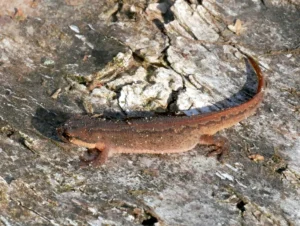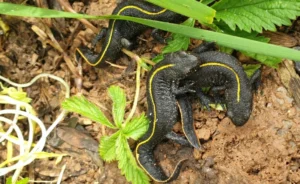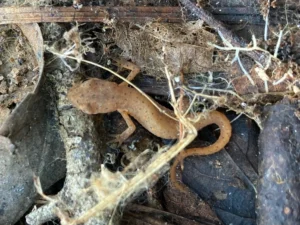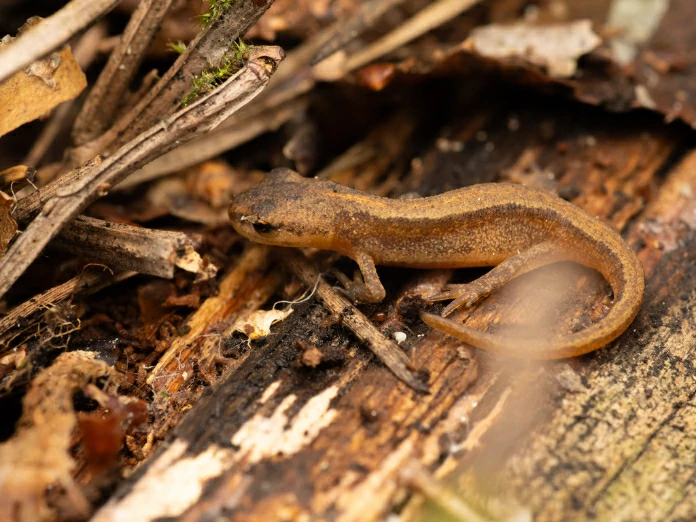Have you ever noticed a small, slippery creature under a flowerpot or crawling along damp soil at night? That might be a newt. Many gardeners see them and wonder: are newts helpful visitors, or do they cause trouble?
Newts are actually great for gardens because they eat pests, balance insects, and show that the soil and water nearby are healthy.
Still, like any wild animal, their benefits depend on how your garden is set up and how you treat them.
Newts as Natural Garden Helpers
One of the biggest benefits of having newts in the garden is their appetite for pests. Slugs, snails, beetles, and other insects can do a lot of damage to flowers and vegetables.

Newts hunt these creatures at night. They glide under leaves, rocks, and logs, snapping up anything they can eat.
If you’ve ever seen tiny holes in your lettuce or cabbage, newts can reduce these pests naturally.
Basically, they’re like miniature garden guardians. Unlike chemical pesticides, they don’t hurt the soil or other plants, they just hunt quietly and efficiently.
How Newts Move Around the Garden
Newts are amphibians, which means they like damp environments. You’ll rarely see them on dry, sunny soil. But in moist areas, under mulch, or near pond edges, they move freely.
At night, especially after rain, they roam your garden looking for food. They crawl slowly but can suddenly dart to catch a worm or slug.
Their sticky, slimy skin helps them move through damp soil without drying out.
For gardeners, it’s fun to watch them. Even though they are secretive, spotting a newt shows your garden is full of life.
Do Newts Harm Plants?
You might worry that newts will eat your plants. The good news: they don’t.
Newts are meat-eaters. They eat insects, worms, small snails, and slugs. They have no interest in leaves, petals, or roots. Your roses, vegetables, and herbs are safe.

Even better, by keeping pest numbers down, they protect plants indirectly. Fewer slugs and beetles mean healthier flowers and veggies.
In this way, newts act as natural gardeners themselves.
Signs of a Healthy Garden
Newts are picky about where they live. They need damp, shady spots, clean water, and plenty of food
. If newts show up in your garden, it usually means your soil and water are healthy.
A garden with frogs, newts, and other amphibians often has a balanced ecosystem. That balance helps plants grow strong, keeps insect numbers in check, and supports birds and other wildlife.
In a way, seeing newts is like getting a natural seal of approval for your garden’s health.
Water Features Attract Newts
Many newts visit gardens because of ponds, small water dishes, or damp ditches. Ponds are especially attractive for breeding in spring.

Even a small container pond can make a difference. Newts lay eggs on submerged plants, and larvae grow in water.
When they leave as juveniles, they keep hunting pests in the garden.
This dual life (water for breeding and damp soil for hunting) makes newts versatile helpers. They link your pond to the rest of your garden, making both ecosystems healthier.
Seasonal Life in the Garden
To really understand their role, it helps to follow a newt through the year:
-
Spring – Adults move to water to breed. Males wave their tails in courtship dances, and females lay eggs.
-
Summer – Juveniles leave water and explore the garden at night, feeding on slugs, worms, and insects.
-
Autumn – Adults leave ponds to spend time in leaf litter, under logs, or in compost heaps.
-
Winter – Many newts hibernate underground, under mulch, or in damp soil.
This yearly rhythm keeps gardens lively. Even when newts aren’t visible, their eggs, larvae, and movements help the garden stay healthy.
Are Newts Safe Around Pets and Children?
Newts have mild toxins in their skin, which they use to deter predators. These toxins are usually not harmful to humans but can irritate sensitive skin.
For children, it’s best not to handle them often. Encourage observation instead of touching. Pets like cats and dogs are curious, but newts are usually too quick to be caught, and the toxins are mild.
Gardens stay safe for both newts and people if you respect their space and don’t pick them up too often.
How to Make Your Garden Newt-Friendly
If you want newts to visit your garden, here are some tips:
-
Add water – Small ponds, dishes, or damp areas encourage breeding and hunting.
-
Create shelter – Logs, leaf piles, and rocks give newts places to hide.
-
Keep soil moist – Mulch and shade help prevent drying out.
-
Avoid chemicals – Pesticides and herbicides hurt both newts and their prey.
-
Plant variety – Dense plants provide cover and attract insects for newts to eat.
Even simple steps make a garden welcoming. Newts may arrive naturally if conditions are right.
Newts and Other Garden Wildlife
Newts don’t work alone. They share gardens with frogs, hedgehogs, birds, and insects. Together, these animals keep balance:
-
Frogs control insects above water.
-
Hedgehogs eat slugs on land.
-
Birds may eat insects and sometimes small newts.
By keeping numbers balanced, newts help reduce pests and keep the garden ecosystem thriving.
Conclusion
So, are newts good for the garden? Absolutely.
They eat pests like slugs and beetles, keep insect numbers balanced, and show that your garden is healthy. They don’t eat plants, and their mild toxins rarely cause problems for humans or pets.
When newts visit, your garden becomes part of a larger ecosystem, balanced, lively, and naturally protected. They aren’t just visitors; they’re tiny gardeners in their own right.
Newts in your garden mean fewer pests, healthier plants, and a living connection to nature.
Hi, my name is Ezra Mushala, i have been interested animals all my life. I am the main author and editor here at snakeinformer.com.

